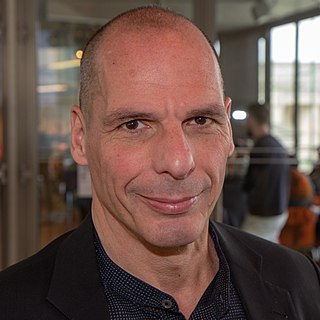A Quote by David Harvey
Not only must weapons be bought and paid for out of surpluses of capital and labour, but they must also be put to use. For this is the only means that capitalism has at its disposal to achieve the level of devaluation now required. The idea is dreadful in its implications. What better reason could there be to declare that it is time for capitalism to be gone, to give way to some saner mode of production?
Related Quotes
Every time I say the word capitalism, everyone just assumes I have plenty of Marxism in me, I do. But Russia and China had their bloody revolutions and even while they were Communist, they had the same idea about generating wealth - tear it out of the bowels of the earth. And now they have come out with the same idea in the end... you know, capitalism. But capitalism will fail, too.
What made women's labour particularly attractive to the capitalists was not only its lower price but also the greater submissiveness of women. The capitalists speculate on the two following factors: the female worker must be paid as poorly as possible and the competition of female labour must be employed to lower the wages of male workers as much as possible. In the same manner the capitalists use child labour to depress women's wages and the work of machines to depress all human labour.
The idea is the least labor and capital and resources you put together and the more you accumulate the better capitalist you are. So the suggestion I will make to you is that the idea of constant accumulation, which is what America is about, what consumerism, NAFTA are about, means that you always take more than you need and you don't leave the rest. So I suggest that it is possible from an indigenous world view that capitalism is inherently out of order with natural law.
...the transition from capitalism to Socialism and the liberation of the working class from the yoke of capitalism cannot be effected by slow changes, by reforms, but only by a qualitative change of the capitalist system, by revolution. Hence, in order not to err in policy, one must be a revolutionary, not a reformist.
The moral justification of capitalism does not lie in the altruist claim that it represents the best way to achieve 'the common good.' It is true that capitalism does -- if that catch-phrase has any meaning -- but this is merely a secondary consequence. The moral justification for capitalism lies in the fact that it is the only system consonant with man's rational nature, that it protects man's survival qua man, and that its ruling principle is: justice
What is the only provocation that could bring about the use of nuclear weapons? Nuclear weapons. What is the priority target for nuclear weapons? Nuclear weapons. What is the only established defense against nuclear weapons? Nuclear weapons. How do we prevent the use of nuclear weapons? By threatening to use nuclear weapons. And we can't get rid of nuclear weapons, because of nuclear weapons. The intransigence, it seems, is a function of the weapons themselves.
We live in capitalism, and capitalism is defined by the production line, and the production line is defined by specificity. If you see yourself as an artist, which I do, then you can't be limited by that. You can't let somebody tell you, 'Well, you can only draw this kind of picture or write that kind of book.'
There's a real difference between venture capitalism and vulture capitalism. Venture capitalism we like. Vulture capitalism, no. And the fact of the matter is that he's going to have to face up to this at some time or another, and South Carolina is as good a place to draw that line in the sand as any.
I know the difference between venture capital[ism] and vulture capitalism. Venture capitalism is a good thing, comes in, gives that gap funding to help these companies get off and get started creating jobs, and work. But Mitt Romney and Bain Capital were involved with what I call vulture capitalism. And they walked into Gaffney and took over that photo album company for no other reason than to basically pick the bones clean. And those people lost their jobs.
We've now become conscious of the uncalculated social, economic, and environmental costs of that kind of "unconscious" capitalism. And many are beginning to practice a form of "conscious capitalism," which involves integrity and higher standards, and in which companies are responsible not just to shareholders, but also to employees, consumers, suppliers, and communities. Some call it "stakeholder capitalism."




































